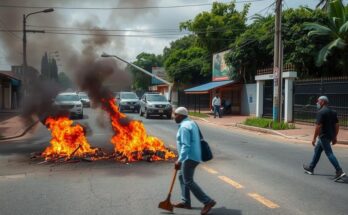President Kais Saied secured a second term in Tunisia’s presidential election, winning 90.7 percent of the votes amid a low voter turnout of 28.8 percent, the lowest since 2011. The election faced criticism due to Saied’s crackdown on political opposition and controversial measures which some view as eroding democratic gains. Many prominent opposition figures were barred from running or imprisoned, raising significant concerns regarding the state of democracy in the nation.
Tunisia held its presidential election on Sunday, resulting in President Kais Saied securing a significant victory for a second term. According to the Independent High Authority for Elections of Tunisia (ISIE), President Saied garnered an impressive 90.7 percent of the votes. Despite this overwhelming support, voter turnout was notably low at only 28.8 percent, marking the lowest participation rate since the revolution of 2011. The electoral commission had anticipated turnout figures around 30 percent, but the actual figures fell short, indicating a lack of engagement from the electorate. In this election, President Saied faced competition from two candidates: his former ally and now critic Zouhair Maghzaoui, leader of the Chaab Party, and businessman Ayachi Zammel. However, Zammel was rendered unable to campaign effectively due to his recent incarceration on charges related to the election. Saied, who has been at the helm of Tunisia’s leadership since 2019, has implemented a series of arrests targeting political opponents and dissenters, raising concerns about the state of democracy in the country. Since the 2011 uprisings, Tunisia was viewed as a beacon of democratic progress in the Arab world; however, various human rights organizations contend that Saied’s administration has eroded many of the democratic achievements made during this period. Critics argue that his rule is characterized by the absence of institutional checks on authority and a crackdown on opposition voices. Prominent political figures from the major opposition parties have faced legal repercussions; many have been imprisoned, with several candidates barred from running in this election. In a broader context, Saied’s consolidation of power involves actions such as dissolving the elected parliament and revising the constitution, moves that have been described by opponents as a coup against democratic principles. In response to criticism, Saied maintains that his actions are necessary measures against corruption and betrayal. Following his election victory, Saied proclaimed, “This is a continuation of the revolution. We will build and will cleanse the country of the corrupt, traitors, and conspirators,” reflecting his commitment to his vision for Tunisia’s future.
The political landscape in Tunisia has shifted significantly since the 2011 Arab Spring uprisings, which initially fostered a sense of optimism regarding democratization in the region. Tunisia was celebrated as a notable success in establishing a more competitive political atmosphere after decades of authoritarian rule, which was marked by widespread human rights abuses and systemic corruption. However, in recent years, the governance of President Kais Saied has sparked controversy and debate over his increasingly autocratic measures, including the dissolution of parliament and amendments to the constitution, which many classify as steps back from democratic governance.
In summary, President Kais Saied’s recent election victory underscores a deeply polarized political environment in Tunisia. While he has received a substantial majority of votes, the alarmingly low voter turnout signals widespread disillusionment among the population. Saied’s governance has prompted significant concerns from human rights organizations about the sacrifices made to Tunisia’s hard-won democratic structures. As the nation progresses forward, the impacts of Saied’s presidency on both the political fabric and civil liberties remain to be seen.
Original Source: www.aljazeera.com




